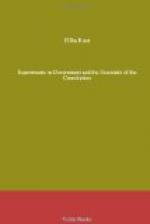Under the first of these proposals, if a specified proportion of the voters are dissatisfied with a judge’s decision they are empowered to require that at the next election, or at a special election called for that purpose, the question shall be presented to the electors whether the judge shall be permitted to continue in office or some other specified person shall be substituted in his place. This ordeal differs radically from the popular judgment which a judge is called upon to meet at the end of his term of office, however short that may be, because when his term has expired he is judged upon his general course of conduct while he has been in office and stands or falls upon that as a whole. Under the Recall a judge may be brought to the bar of public judgment immediately upon the rendering of a particular decision which excites public interest and he will be subject to punishment if that decision is unpopular. Judges will naturally be afraid to render unpopular decisions. They will hear and decide cases with a stronger incentive to avoid condemnation themselves than to do justice to the litigant or the accused. Instead of independent and courageous judges we shall have timid and time-serving judges. That highest duty of the judicial power to extend the protection of the law to the weak, the friendless, the unpopular, will in a great measure fail. Indirectly the effect will be to prevent the enforcement of the essential limitations upon official power because the judges will be afraid to declare that there is a violation when the violation is to accomplish some popular object.
The Recall of Decisions aims directly at the same result. Under such an arrangement, if the courts have found a particular law to be a violation of one of the fundamental rules of limitation prescribed in the constitution, and the public feeling of the time is in favor of disregarding that limitation in that case, an election is to be held, and if the people in the election vote that the law shall stand, it is to stand, although it be a violation of the constitution; that is to say, if at any time a majority of the voters of a state (and ultimately the same would be true of the people of the United States) choose not to be bound in any particular case by the rule of right conduct which they have established for themselves, they are not to be bound. This is sometimes spoken of as a Popular Reversal of the Decisions of Courts. That I take to be an incorrect view. The power which would be exercised by the people under such an arrangement would be, not judicial, but legislative. The action would not be a decision that the court was wrong in finding a law unconstitutional, but it would be making a law valid which was invalid before because unconstitutional. In such an election the majority of the voters would make a law where no law had existed before; and they would make that law in violation of the rules of conduct by which the people themselves had solemnly declared they ought




